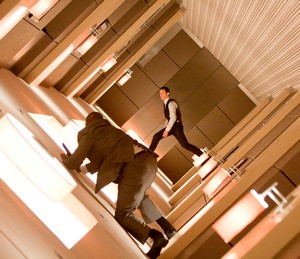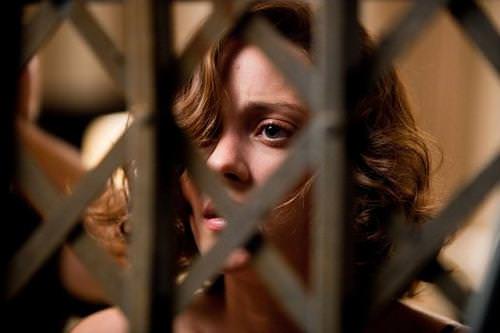10 Things I Like About Inception
The leading lucid dreaming author, Robert Waggoner, describes 10 things he likes about Christopher Nolan's new lucid dreaming movie: Inception.
Recently I was asked by ABC News to comment on Christopher Nolan's new movie Inception, which I was happy to do. But as it's impossible to do the movie justice in a 15-second sound bite, I want to offer you my list of 10 things I like about Inception...
#1 - It Begs The Question
"Dreams seem real while we're in them," the main character, Cobb, says.
It's a simple point, but an important one, and the dream sequences in Inception get it right.
As the team's newest student, Ariadne, learns, the assumed reality of our experience, waking or dreaming, seems to us compellingly real.
It's only when the street disintegrates that we question reality.
Just a few nights ago a dream figure asked me, "How do you know you're not sleeping right now?" I blew him off for asking such a sophomoric question - and woke up in my bed!
#2 - Expectations Rule
Inception illustrates the way in which expectations operate in the dream state.
 Cut your finger in a lucid dream and you'll feel pain - unless you actively expect otherwise. Even in lucid dreams we carry with us the idea of physical senses.
Cut your finger in a lucid dream and you'll feel pain - unless you actively expect otherwise. Even in lucid dreams we carry with us the idea of physical senses.
Yet there is an escape clause: the mind's expectation about what it experiences. To feel pain in a lucid dream, you must mentally believe in it.
No belief, no pain.
#3 - Subconscious Creativity
The brilliant creativity accessible to lucid dreamers shines through Inception like the sun - and is equally taken for granted.
Aware in the subconscious, the mind's warehouse of creativity stands completely open and ready for requests.
Many lucid dreaming painters, novelists, song writers, programmers, and engineers access their muse while consciously aware in the dream state, and marvel at its beauty and creativity.
Lucidly knock on the door of your subconscious, and creativity opens it.
#4 - A Cautionary Tale
Inception offers a cautionary tale. Lucid dreamer Cobb fails to resolve major personal issues and they prove to be his undoing.
Dream architect Ariadne repeatedly begs Cobb to deal constructively with his guilt and grief; instead, he both avoids and befriends his guilt and grief, and it accompanies him in each layer of the mind.
Cobb fails to learn the fundamental psychological lesson of lucid dreaming: No matter where you go, there you are.

#6 - The Spiritual Journey
Inception shows us the vast creativity of the subconscious in the hands of a psychologically wounded lucid dreamer who fails to learn his lessons and so accumulates increasingly complex karmic wounds.
Whatever else you may think, lucid dreaming remains, fundamentally, a spiritual journey. Until you clear away the emotional and psychic wounds and misperceptions, they distort your view, your understanding, and the lucid landscape.
Once they are taken care of, lucid dreamers see clearly that lucid dreaming follows a spiritual path of extraordinary beauty, complexity, and depth.
#7 - Layers of Lucidity
Inception illustrates what most experienced lucid dreamers know: layers of lucid awareness exist.
While the movie relies on the "dream within a dream within a dream..." metaphor, some lucid dreamers have become consciously aware and moved to other levels of consciousness.
How? Well, they didn't use Inception's fantasy device, PASIV; rather, they did it the old fashioned way: they used the power of the mind.
Next time you're lucid dreaming, shout out, "I want to go to the next level!" and see what happens.

#8 - Future Technology
Inception hints at, but never asks, "How would society respond if technology offered a drug and device that would place you with others in a stable lucid dream?"
Would you give up weekly bridge games for a few hours in a shared Holodeck, lucidly aware with friends?
I can only speculate, but a chemical compound that creates stable lucid dreams may be discovered in our lifetime. Science fiction seems headed toward science fact.
One day those weekly bridge games may collapse faster than bee colonies, as people swarm to lucid dream gatherings.
#9 - An Alternative Reality
Inception presents us with something lucid dreamers grind their metaphysical teeth on: another type of reality.
Sure, physical reality has physical pleasures: peaches and watermelons in season, Lady Gaga. But physical reality also has death, taxes, and lute fisk.
Lucid dreaming offers whatever you expect and more in a lucid reality; except that it's not real.
Or is it?
If you step outside of Plato's physical cave and stumble into Plato's lucid dream cave, who's to know?

#10 - Reality Checks
I like Inception for bringing up these reality checking ideas, these "How do I know that I know?" questions that push thousands of lucid dreamers like myself to go deeper and deeper, to play lucid dreaming reality off of so-called physical reality, to see more clearly the attributes of a physical, mentally mediated reality (waking) contrasted to a mental reality with Gumby-like physical forms (lucid dreaming), and to experience, behind it all, the unseen Architect, the "awareness behind the dream" that I discuss in my book, Lucid Dreaming: Gateway to the Inner Self.
Final Thoughts
So these are 10 things I like Inception.
Hey, wait a minute. There are only nine reasons here. My software arbitrarily removed #5 - no kidding.
I guess that's the final reason I like Inception: the minor details and anomalies our awareness floats over and fills in reminds us of the mentally "created" aspect of this experienced reality.
Who knows, maybe we're dreaming, right now, but managed to overlook that, too.
About The Guest Author
Robert Waggoner is a lucid dreamer and author of Lucid Dreaming: Gateway to the Inner Self. He is President-Elect of the International Association for the Study of Dreams (IASD). Check out his lucid dreaming blog at Lucid Advice or subscribe to the quarterly Lucid Dreaming Experience.

















